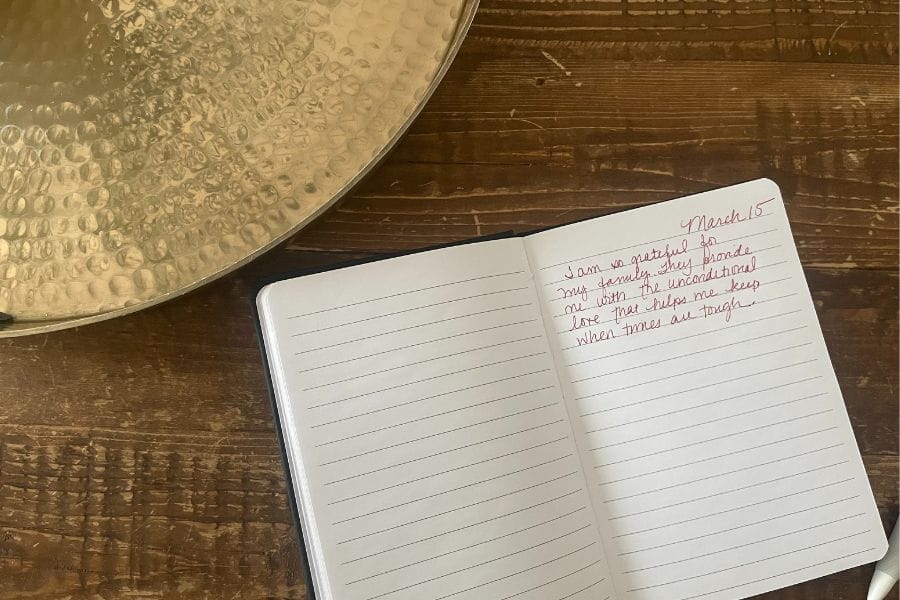How to Start Journaling for Beginners: A Self-Care Practice
If you’re looking to learn how to create a self-care practice with data behind it, here’s journaling for beginners.

Work, house, kid’s schedules, the dog, trying to maintain some semblance of keeping it together each day-these are only a few of the million thoughts that race through the mind of a typical working mom. Some days, it feels like you’re killing it; other days, it feels like it’s killing you. So, what’s a girl to do?
Let me sell you on the value of and the how to of practicing journaling for beginners to keep the chaos of every day in check.
The Purpose of Journaling
Sure, there are many avenues you can take to keep yourself healthy, happy, and successful. However you define it, and journaling is a practice that can get you there. The best part of incorporating journaling as a form of self-care is that it’s simple and easily accessible.
Journaling helps with overwhelming thoughts, improves mental clarity, and contributes to better self-awareness and emotional well-being (all of which can help in parenting, work, and the rest of life).
Journaling is also great because it’s a simple and inexpensive practice that has great returns on your time investment.
{A Simplified Guide to Self-Care Practices for Working Mothers}

How to Journal for Self Improvement
If you’re on the journey to improve, then journaling can help get you there. There are a plethora of reasons people take on the journaling practice.
Emotional Release: Journaling is a fantastic tool to release pent-up emotions. You never have to share what you wrote with anyone, so you can be as honest as you need.
Mental Clarity: Journaling clears mental clutter that takes up too much of your mental space and leads to feelings of overwhelm.
Stress Management: When we know how we feel and can pinpoint our emotions and stressors, we can then organize our thoughts enough to reduce the chatter that creates our stress.
Planning Goals: Using a journal to track success can help you focus on goals. It can help you learn where you’re doing all the right things and where you want to go.
Journaling Tips
Start Small: Realizing that journaling doesn’t need to take hours and can be scheduled for small time increments to start, helps you take action because it seems more doable.
Incorporate It Into Daily Routines: Find a time when you can spare a few minutes. Usually, it’s at the beginning or end of the day. Does your child go down for a nap? Maybe you eat lunch alone? Find a time when you can dedicate five minutes to start.
Don’t strive for perfection: Seriously, your journaling practice will evolve with time. Once you see what benefits your mental health, you may want to follow that path for a while. If you want perfection, it will get in the way of progress, so simply start with pen to paper and see where it goes.
Choose any format that works for you: If you are not a fan of pen to paper, create a digital journal to download all the chaotic thoughts. There are benefits to handwriting your concerns, but you will still make progress if you go digital. You can even find digital downloads of journaling prompts on the internet and Pinterest.

What to Write About?
Gratitude: Putting a focus on gratitude has an actual impact on your brain and the chemicals released that help you feel better. Focusing on the simple question What are 3 things I’m grateful for today? Makes for a perfect journal entry!
Brain Dump: Brain dump is a stream-of-consciousness writing technique where you drop all of your concerns onto your page (big and little concerns). By getting it all out of your head and onto the paper, you can see what you have control over, what is worth your time, what’s easy to fix, etc. Include everything. Big and small concerns can be dumped onto your paper.
Life Wins: Focusing on your success becomes a chronicle of achievements that you can refer back to when you don’t think life is going your way.
Goals and Plans: Use your journal practice to chisel out a path for yourself. Whether you have a big goal or need to figure out how you can better take care of yourself, you can journal about it.

How to Journal Daily
Being intentional with your practice will make your journaling so much more valuable for your overall health. Put a value on it by designating a time that you will spend to it each day, and, during that time, do your best to be thoughtful.
That’s not to say that you will always want to write or know what to write. Don’t hate on yourself if that’s the case.
Review old entries to see your progress. That’s one of my favorite aspects of journaling. You can go back to older posts and see what was bothering you or where you were in your goal. When you see the growth, it helps you keep perspective on what’s bothering you now.
Start Journaling Now!
Hopefully, you see the value in spending time journaling to help you declutter your mind so that you can keep going on being the best mom in the world! With your overwhelming thoughts on the page, you can be more present and connected to your kids!

Journaling Prompts for Self Care
Below are 30 journaling prompts to help you get started. Use them to inspire ideas. Some may apply directly while you may need to modify other prompts to suit your needs.
30 Journaling Prompts to Start
Gratitude
- What was the best small thing that happened to me today? Why did I love it so much?
- How am I able to make a difference in others’ lives?
- What goal have I accomplished for myself that makes my life special?
- Who am I grateful for?
- What worked out for me that I didn’t think would work out?
- What three things am I blessed to have in my life?
- What has my job provided me that made my life better?
- Who/What puts a smile on my face whenever I see them/it?
- What are three things that make where I live so special?
- Write a letter of thanks to someone who has impacted you (you don’t need to send it).
Goals
- What goal do I want to achieve? What do I need to do to make it happen?
- What three things can I do today to help me move towards success on my goal?
- What obstacles have I encountered when going after my goal? How did I react? What could I have done better?
- Why do I want to achieve this goal? How will it improve my life?
- What qualities do I have that will help me succeed at this goal?
- What do I need to learn to succeed at this goal? Where can I go to learn it?
- How can I measure my success with my goal? Where am I now?
- Identify successes that you’ve had this week. How will you grow in those areas?
- How is my success improving my relationship with myself?
- How is my success improving my relationships with my family?
{Related Post: Goal Setting How to: 5 Steps to set Goals You Can Actually Achieve}
Overwhelm: First Brain Dump and then plan with these questions
- What isn’t a big deal on this page? (things like too much laundry might show up)
- What thoughts do I have that I have no immediate control over the outcome? (things like the news and politics might be here)
- Which thoughts do I have control over the outcome?
- What can I fix easily today? (Maybe there are phone calls and appointments that need to be made)
- What are short-term concerns and long-term concerns? (long-term might include concerns like debts)
- Can I ask someone else to take care of any of these things? Who? (You may be able to get your kids and husband to help with some chores if you’re feeling overwhelmed)
- Long-term concerns: What do I need to get done first and last?
- Make a plan for each of the long-term concerns: what can you do today? This week? This month? When will you be done with this concern?
- How much time can I give each day to my concerns? When can I spend time doing these things?
- Create a weekly schedule where you can designate what you will get done (small tasks and steps to make a difference in large tasks). Commit!
This post was all about how to start journaling for beginners. The most important aspect is that you simply start. I hope you find inspiration in this and take action!






